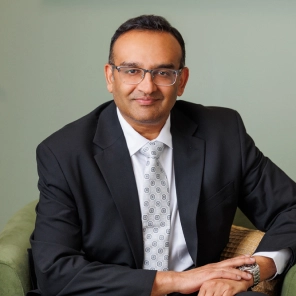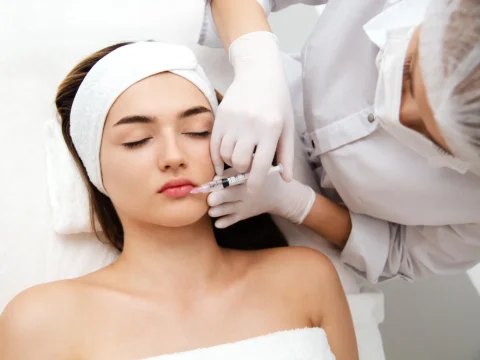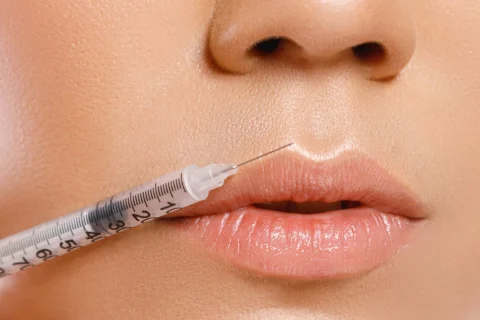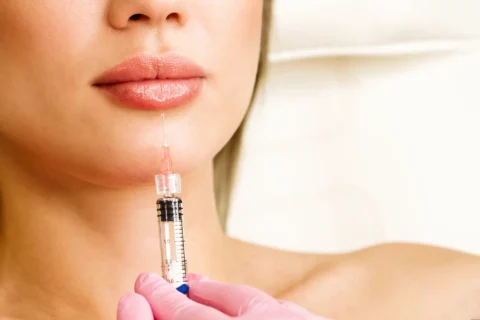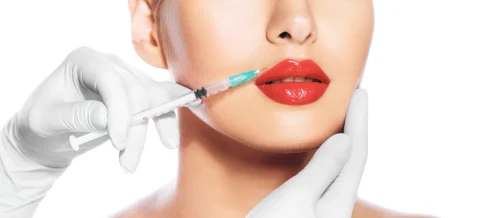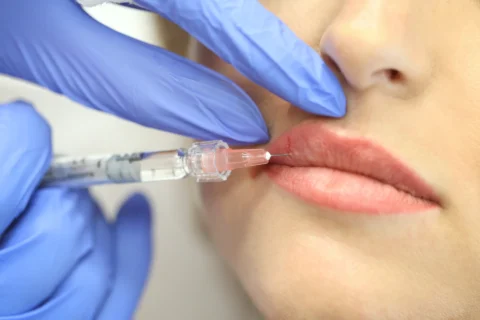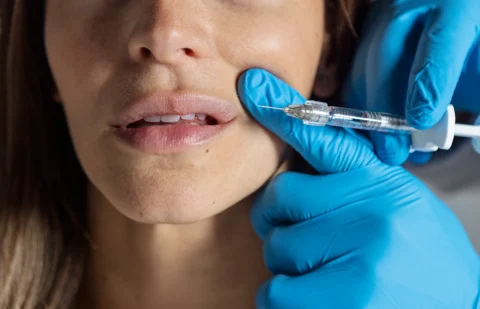Every year, millions of women embark on the quest for plumper, more kissable lips. Dermal fillers have revolutionized this beauty routine, offering non-surgical volume with natural-looking results. But what happens after those pillowy lips are achieved?
That’s where many patients get confused. Can you pop an ibuprofen to soothe the post-procedure pain and swelling? Or will that do more harm than good? Let’s explore why proper aftercare is so important for ensuring your new pout stays pretty.
Understanding Lip Fillers and the Injection Process
Lip fillers, also known as dermal fillers when used in other areas of the face, involve injecting a gel-like substance into the lips to add volume and fullness. Most lip fillers consist of synthetic hyaluronic acid, a natural substance in the body.
The lip filler procedure begins with applying a topical anesthetic to numb the lips, which takes 15 to 30 minutes to become effective. The use of a thin needle is for the precise injection of the filler into the lips. In the hours after treatment, patients notice swelling and bruising that typically lasts a few days as the body responds to the minor trauma of the injections.
While topical anesthetics provide comfort during the procedure, the numbing effects can persist for several hours after, masking pain that emerges later. Proper post-treatment care and adhering to lip filler aftercare instructions are integral to optimizing results and healing safely. This includes avoiding strenuous activity, massaging the area, or other behaviors that could disrupt how the filler integrates with the body’s tissues.
Ibuprofen and its Role in Post-Treatment
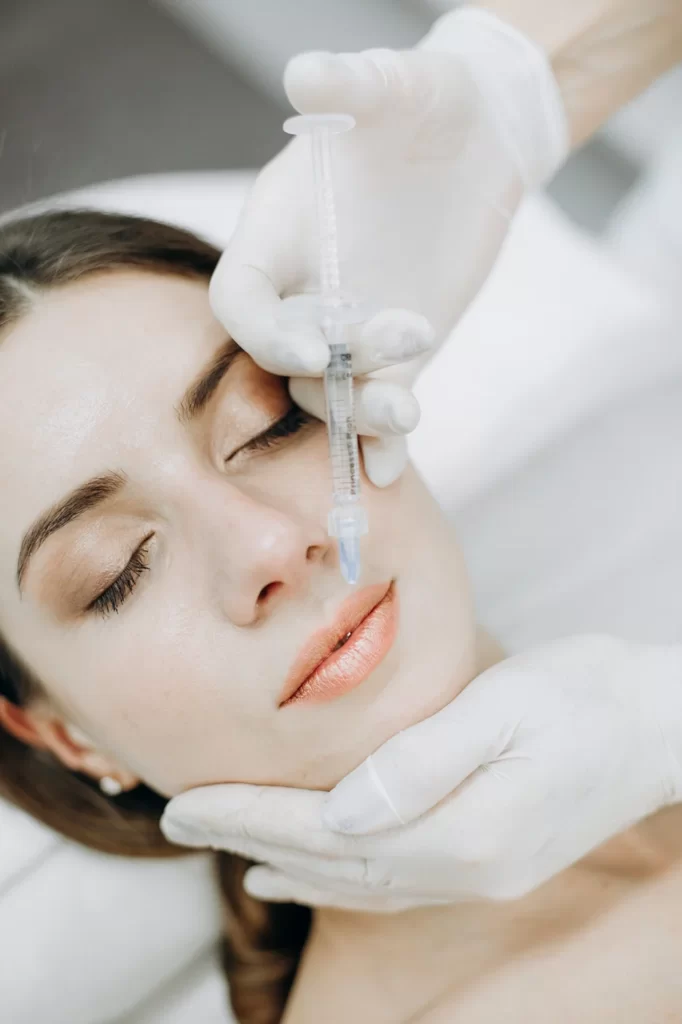
Non-steroidal anti-inflammatory drugs (NSAIDs) like ibuprofen are a common class of medication used to reduce pain, swelling, inflammation, and fever. Ibuprofen works by inhibiting the production of prostaglandins, which are hormone-like substances that stimulate pain and inflammatory responses in the body. While useful for other conditions, NSAIDs can negatively impact the healing process after lip filler treatment due to their blood-thinning effects.
Ibuprofen’s blood-thinning properties come from its ability to inhibit cyclooxygenase (COX) enzymes, which are involved in the production of compounds that promote clotting. By blocking COX-1 and COX-2, ibuprofen hampers the body’s natural clotting ability. This can make it more difficult for blood to coagulate at injection sites and within surrounding blood vessels.
During a lip filler procedure, the injectable dermal product is deposited into tiny superficial blood vessels in the lip area. As the body initiates its immune response to the foreign substance, minor bleeding and bruising are common. For bruises to fully dissipate, clots must form and blood vessels must constrict. Ibuprofen’s anti-clotting effects jeopardize this natural healing cascade by potentially prolonging capillary bleeding and exacerbating bruising.
Studies have shown NSAIDs increase bruising severity when used around the time of lip filler or other dermal treatments. The anti-platelet activity of these medications interferes with the blood’s clumping abilities, leaving it thin and susceptible to oozing from injection sites. Persistent discoloration and slower recovery can occur as a result.
For most patients, it’s recommended to avoid ibuprofen and other NSAIDs for at least 3-5 days before and after lip filler injections. This allows the body’s coagulation mechanisms to fully support natural bruise resolution without outside impediments. While short-term ibuprofen may help relieve acute pain or swelling, its long-term effects on clotting jeopardize the outcome of expensive cosmetic enhancements. Overall health and previous medical conditions may also influence an individual’s ability to avoid NSAIDs.
Other Medications and Supplements to be Wary of Post-Lip Fillers
Other blood thinners like aspirin should be avoided for 24-48 hours before and after treatments as these increase bruising risk by thinning the blood.
Herbal supplements such as Ginkgo biloba and fish oil can also act as blood thinners through effects on platelet aggregation and must be discontinued for a few days pre- and post-procedure.
Those prone to cold sores should take antiviral medications before and after lip filler injections. The minor trauma from injections can potentially trigger a herpes simplex virus outbreak in susceptible individuals. Antivirals help prevent virus reactivation when taken at early signs or during times of increased risk. Forgetting this step poses the hazard of unsightly cold sore eruptions marring otherwise improved lips.
Natural Reactions and the Body’s Response to Lip Fillers
- Swelling is a very common side effect following lip filler injections as fluid accumulates in response to the minor tissue injury. Some individuals experience more pronounced swelling than others based on variables such as filler volume used and healing characteristics. Applying ice or cold compresses helps constrict blood vessels and mitigate swelling symptoms in the lips.
- As swelling develops, the body’s circulatory response escalates to deliver immunity cells and nutrients to the treated area. This follow-up reaction leads to a temporary increase in blood flow and heart rate during the recovery period. For most patients, these circulation changes subside within the first few days as natural healing progresses.
- Those with a history of herpes labialis infections, known as cold sores, are susceptible to outbreaks after the localized trauma of injections. The stress placed on facial nerves stimulates virus reactivation in some predisposed patients. Beginning antiviral prophylaxis before and continuing after the procedure can effectively avert embarrassing cold sore episodes resulting from the treatment itself. While an uncommon effect, preventative measures provide prudent protection against this potentially inconvenient adverse event.
Complementary Aftercare Recommendations
- Hydration: Drinking plenty of water keeps tissues hydrated, which supports healing. It also helps thin the blood for quicker bruise dissipation. Dehydration has the opposite effect. Straws should be avoided as they can mechanically irritate tender, swollen lips.
- Icing: Applying an ice pack or cold compress to the lips for the first 48 hours constricts blood vessels, and reduces pain and swelling from the procedure. Cold therapy soothes discomfort while decreasing overall volume in the treated area.
- Activity modification: Strenuous exercise or activities that can cause elevated blood pressure for 24 hours post-procedure should be avoided. This gives tissues time to recover without facing undue movement, strain, or circulatory demands that could disrupt the filler integration process or prolong swelling.
- Temperature regulation: Excessive heat from hot showers, saunas or very warm environments is best delayed for a full day as this may cause estrogen-related increases in inflammatory responses or blood flow that interfere with healing. Cooler conditions are more soothing.
- Diet considerations: Spicy, acidic, or nitrate-rich foods should be consumed in moderation as these can theoretically worsen swelling, redness, or bruising through their effects on circulation or pH levels in healing tissues.
Additional Tips for Effective Recovery
| Tip | Information |
| Sun protection | Direct UV exposure can cause sunburn, increasing inflammation, swelling, and risk of infection. It’s best to avoid sunlight on the lips and liberally apply SPF 30+ sunscreen for several weeks as the dermal filler integrates. Reapplication is important as directed. |
| Use Gentle Cleanser | Using a bland, fragrance-free cleanser and limited rubbing or massaging of the lips aids healing. Harsh soaps can dry or irritate the delicate skin. Saline rinses also gently remove surface debris without disrupting healing cells. |
| Vitamin E precautions | While alpha-tocopherol supports collagen production and has anti-inflammatory properties, supplementing vitamin E remains controversial. Higher-than-RDA doses may possibly exacerbate bleeding or bruising through anticoagulant mechanisms. Consulting one’s practitioner is prudent before beginning or altering any supplements. |
| Emollient use | A thin layer of hypoallergenic moisturizer keeps lips soft and supple without occluding the skin. Petrolatum-based ointments are best avoided due to their potential comedogenic properties. |
Why Following Medical Advice is Crucial
Ignoring important aftercare guidelines could potentially lead to adverse outcomes that impact safety and satisfaction. Cases where instructions around medications, sun exposure, or physical activity are dismissed risk procedural complications like vascular obstruction from impaired healing. When blood vessels transporting the filler gel become damaged or blocked, discoloration and necrosis can occur.
It’s equally important to disclose a full medical history and lifestyle habits upfront to help practitioners properly assess any underlying factors influencing one’s tolerance for lip injections. Conditions like diabetes, autoimmune disorders, or peripheral vascular disease may require customizing the treatment approach or modifying activities in the weeks afterward.
No two patients respond identically to injectable procedures due to anatomical and biological variables. Strictly adhering to a practitioner’s tailored aftercare instructions maximizes each individual’s chances of optimal results while avoiding pitfalls. Respecting their expertise derived from extensive experience with countless similar cases ensures the enhanced appearance remains long-lasting and complication-free.
Getting the Best Results From Ethos Aesthetics + Wellness
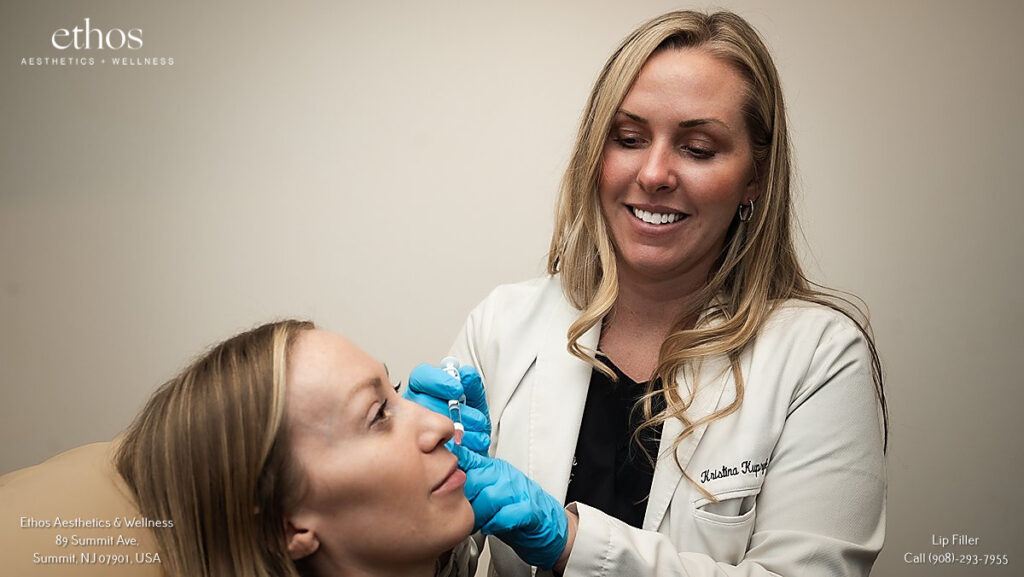
By following the aftercare guidelines discussed in this article, you can optimize your chances for fantastic lip filler results and a smooth, healthy healing process. However, individual circumstances do vary – which is why consulting directly with the experienced professionals at Ethos Aesthetics + Wellness is so highly recommended.
Whether you’re considering lip fillers or other non-surgical cosmetic treatments, booking an appointment with Ethos Aesthetics + Wellness ensures peace of mind from start to finish. Our commitment to safety, natural beauty, and client satisfaction has earned us a trusted reputation you can feel good about.
